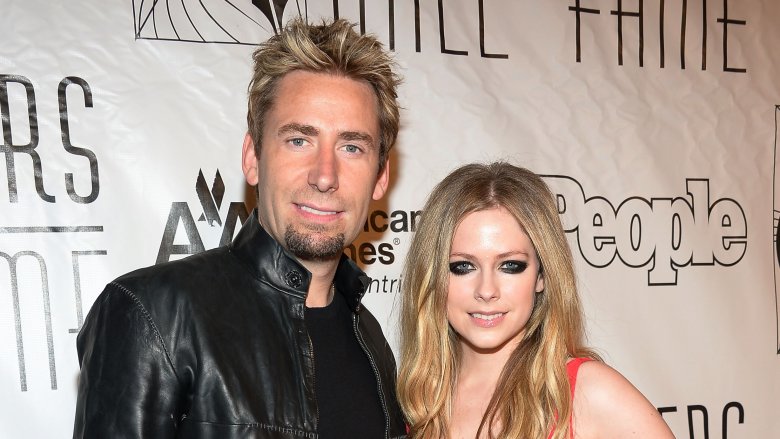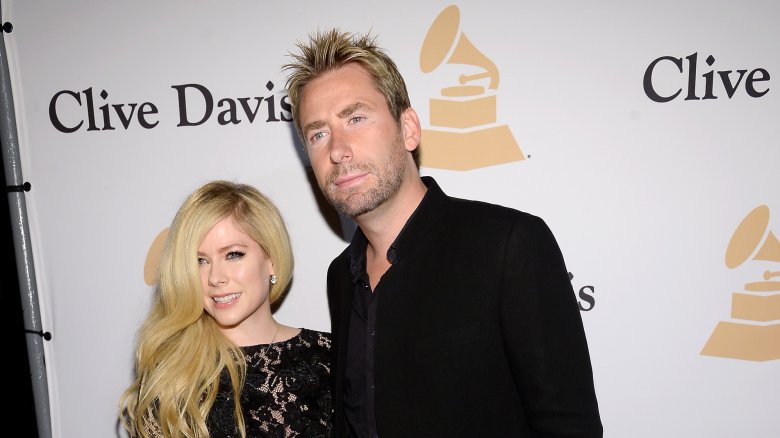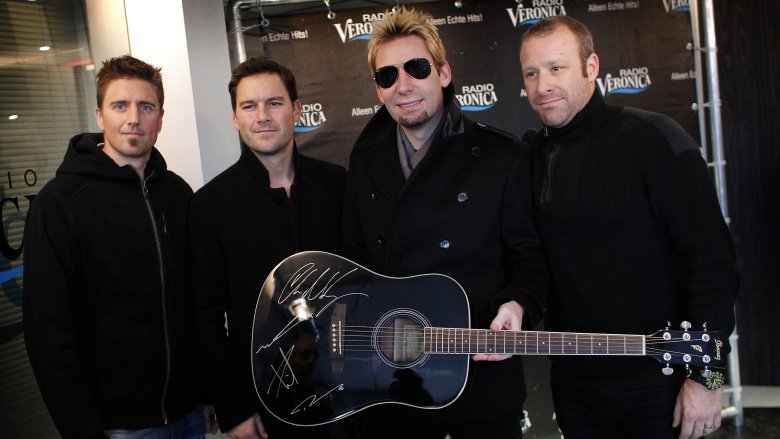How Nickelback Became The Most Hated Band In The Music Industry
Becoming the most hated band in the music industry doesn't happen overnight. Like growing psychedelic mushrooms in your closet as a teenager, it takes a rare combination of patience, rebellion, and dirt to make the magic happen.
Listening to Nickelback is not on par with a mushroom trip. It's more akin to taking salvia: completely legal, with an undeniable fan base, but frighteningly disconnected from reality and still capable of leaving you damaged.
What is it about this band — which sells out Madison Square Garden and has sold more than 50 million albums worldwide, according to Observer — that makes them so despised? Indeed, how can such widespread appeal and infamy coexist side by side? Here's how Nickelback became the most hated band in the music industry.
Their songs all sound the same (and stupid)
As noted by the New Yorker, Nickelback started out as a '90s cover band in Alberta, Canada. Lead singer Chad Kroeger's growling voice and metal-influenced sound stood out at the time, but instead of evolving their songwriting chops through the years, Nickelback constructed tune after generic tune that followed the same simple and obvious formulation. Kroeger yoked his deep voice to basically one guitar tonality and song structure, creating monotonous crowd-pleasers that lacked originality.
Ladies and gentleman of the jury, Exhibit A. The video above demonstrates how two of their most popular songs, "How You Remind Me" and "Someday," follow the same vocal cadence and instrumental background, and it's really pretty astonishing. Their content is good for the radio masses, but it doesn't offer much depth or creativity. Good luck playing an album straight through.
You can only hear bad songs so many times...
Because Nickelback's generic and formulaic music is well suited for the radio, it's not surprising that their songs are tremendously successful from a commercial perspective. "How You Remind Me" became the most played radio song of the 2000s (per Nielsen), with over 1.2 million plays between 2001 and 2009.
Hearing the same song over and over again gets on anybody's nerves, so that likely helped turn public opinion against Nickelback. But Canadian citizens may bear the brunt of this angst: The Canadian Radio-Television and Telecommunications requires Canadian radio stations to play a certain amount of music that's produced in Canada. If you're already tired of hearing their songs, definitely don't move to Canada.
A famous Comedy Central diss fanned the flames
Downfalls of Nickelbackian proportions usually rely on a perfect storm, where elements beyond the band's control come together to form a maelstrom of discontent. One such element came over the TV airwaves back in 2003, prepping everyone for the horror that was to come. Comedy Central was running a well-advertised panel show called Tough Crowd with Colin Quinn. The show involved four comedians who discussed topical news stories. On one episode, comedian Brian Posehn brought up a study that tied violent lyrics to violent behavior. He quipped, "No one talks about the studies that show that bad music makes people violent, like [listening to] Nickelback makes me want to kill Nickelback."
A clip of the joke turned into a promo that ran during commercial breaks for months. Everyone who watched Comedy Central during that time was bound to see it at some point, and Nickelback's awfulness was cemented early on for a good number of people.
Chad Kroeger acts like a terrible frat boy
One of the most offensive aspects of Nickelback is frontman Chad Kroeger, who's responsible for most of the band's image. Rather than inhabiting the spotlight with grace, or even a rockstar's cavalier recklessness, he repeatedly engages in — and brags — about juvenile behavior more fitting a frat boy shotgunning Natty Lites than a professional musician.
During a Playboy interview, Kroeger talked about the time he blew his own love whistle for a free case of beer, and bragged about his binge-drinking abilities. "I drank 13 Coronas in a row once, in Cabo San Lucas," he said. "The little flap that seals off your stomach and keeps the food from coming back up in your throat, I f*cked that up. I can get a Corona down in five or six seconds."
Kroeger's oblivious behavior even veers into the harmful. He regaled Men's Health with one of his "favorite stories": the time he was on tour in Germany and paid a drum tech approximately 600 deutschmarks to stick his ding-dong into a metal-bladed fan. Couple that incident with his 2008 DUI, and it's easy to see how Kroeger's antics shows an alarming lack of concern for others. This is as good a reason as any to write off Nickelback.
It's not actually cool to sing about misogyny and awful things
Nickelback's lyrical content, written by Kroeger, contributes to their bad name. His descriptions of women reduce them to a series of actions and body parts aimed at fulfilling his own desires and fantasies. Occasionally, these descriptions veer into darker territory with imagery that hints at violence and abuse.
Several songs use degrading language to describe one of the most intimate things a human can do. In "Figured You Out," after mentioning that he likes a woman's pants around her feet, Kroeger croons that he "likes the way you still say please / While you're looking up at me." The transparently titled "Something in Your Mouth" brushes his misogyny in even broader strokes: "You're so much cooler when you never pull it out / 'Cause you look so much cuter with something in your mouth." All right, we get the picture. Why doesn't he just literally spell it out for us? Ahh, he saved that for his song "S.E.X."? (Key lyric: "Sex is always the answer, it's never a question.") Or better yet, not say it at all: hearing someone sing "I love your lack of self-respect / While you're passed out on the deck / I love my hands around your neck" contains enough tasteless shock value as it is.
They helped spawn even more bands that sound exactly like them
Continuing to march onward despite even early cries of "sell-out," Nickelback took it upon themselves to create carbon copies of their band. Theory of a Deadman is a Vancouver-based Canadian band that Kroeger pulled strings for after he heard a demo tape. Besides bringing them onto the soundtrack of 2002's Spider-Man and co-writing six of the 10 songs on their self-titled 2002 debut, he signed them to his record label, 604 Records. Listen to Theory of a Deadman's song "Bad Girlfriend" (above), and it's hard to tell where Deadman ends and Nickelback begins.
Kroeger continued to add insult to injury when he signed the band My Darkest Days to 604 Records. The band sounds like an unfortunate combination of Nickelback and Kid Rock. As if we needed to know!
They licensed 'Rockstar' for a furniture commercial
But hey, you don't need to rely on simple logic to see why Nickelback is so widely disliked: a Finnish researcher conducted a study on the topic. Titled "Hypocritical Bullsh*t Performed Through Gritted Teeth," the study pointed out some of the obvious answers we've already mentioned. But the watershed moment for the band's demise may have come with the song "Rockstar."
Nickelback wrote "Rockstar" in 2005 and then licensed it for a furniture commercial in the U.K. in 2008. Sadists can watch the commercial; everyone else can take comfort in knowing it's exactly as bad as you'd expect. The commercial showed Nickelback had no real standards and didn't understand the difference between a band and a jukebox. Right around the time Nickelback released the song, their reputation started sliding. Attendants at a hard rock festival in Portugal threw rocks and bottles at them. A petition asking Nickelback not to perform at an NFL halftime show received nearly 56,000 signatures.
Selling out to a furniture company helped send things downhill for Kroeger and friends, and even worse, the furniture ad was later pulled for making the furniture look bigger than it was (via The Guardian). If only the same could be done to Kroeger's ego.
They think they're too cool for charity
Another nail in Nickelback's coffin came during the Alberta Flood Aid fundraiser concert they headlined in 2013. Over 32,000 people attended the live-streamed festival, which raised $1.5 million for flood relief. Attendants, organizers, and the musicians themselves were all basking in the mood of goodwill and good tunes. According to the Calgary Herald, that lasted until Nickelback took the stage and requested that the livestream for at-home viewers be cut. Sponsor Telus then sent out the following tweet: "Hi everyone. The @Nickleback [sic] exclusive performance was a request from the band. Sorry we couldn't live stream this portion of the concert."
The social media backlash came fast and quick. Nickelback fans protested the band's decision, while others criticized the band for being stingy with their music at an event created to promote goodwill. One of the band's associates took to Twitter to curse at other Twitter users and to defend Nickelback by claiming the band generously spent their own money for transportation of gear. By then, however, the damage was already done.
Kroeger married Avril Lavigne because poseuring loves company
Canadian artist Avril Lavigne became a mainstream success by appropriating a genre that defines itself as counterculture. The music video for her song "Sk8er Boi" depicted her teenage arms wearing studded leather wristbands and tiny tattoos, while her clear skin and squeaky-clean sound belied any real identification with the movement.
So when she and Kroeger got married in 2013, it was in some sense a perfect marriage. They were both massively successful sell-outs, famous for creating radio-play friendly hits that gave a middle finger to authenticity. Their union gave people ample ammunition to criticize their partnership. The two eventually divorced, but possibly due to their similar public image, Avril still fights Kroeger's battles for him. When Mark Zuckerberg made a joke at Nickelback's expense, Avril pushed back and accused him of "bullying" Nickelback.
The internet made it hip to hate on them
The internet changed everything for everybody. For Nickelback, that change meant a larger platform for haters to band together and churn out anti-Nickelback content. One notable example is a Facebook page called "Can This Pickle Get More Fans Than Nickelback?" According to The Guardian, at one point in 2010, the pickle fan page had more fans than the band's fan page did. Compare 1.47 million pickle fans to 1.42 million Nickelback supporters. Anti-Nickelback captions began appearing on popular trending memes such as Grumpy Cat and Bad Luck Brian. Some of these memes made fun of specific things, like Kroeger's hair. Others just poked fun at Nickelback for being Nickelback. Their bad reputation preceded them, making room on the bandwagon for knowledgeable haters and naive newbies alike.









